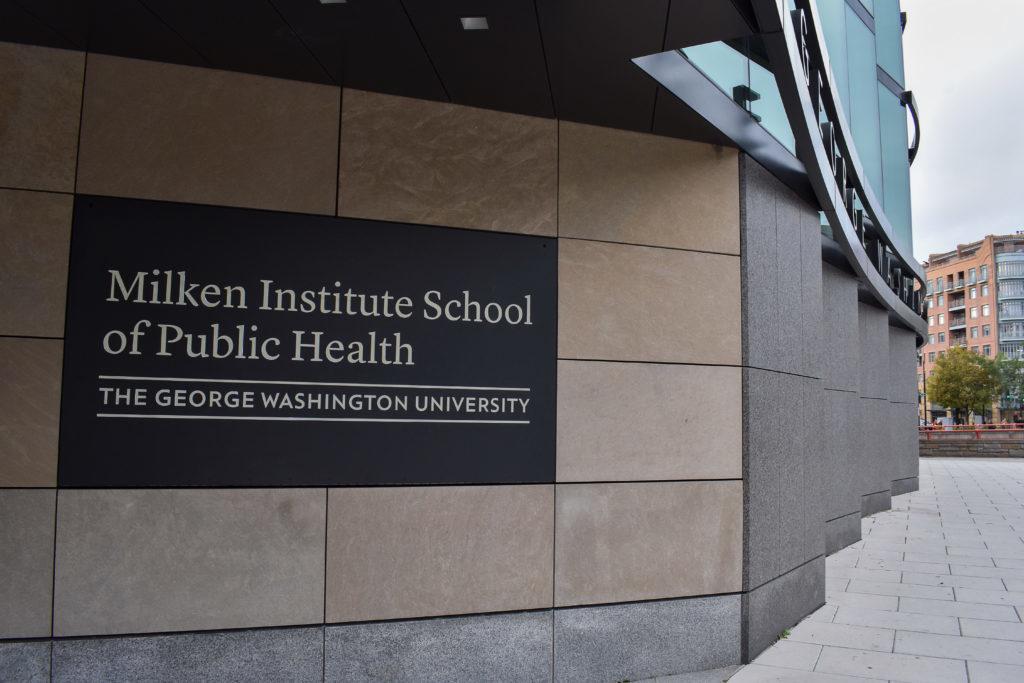Students will be able to learn about health policy and management in a new doctoral program next fall.
A 48-credit doctoral health policy program housed in the Milken Institute School of Public Health launched last week and will cover topics like health disparities and Medicaid policies, faculty said. Faculty and health policy experts said the new degree will teach students the necessary skills to understand and research health policy during a time when health legislation is a polarizing political topic.
The public health school currently offers two other doctorate degrees, including one on epidemiology, the study of diseases, and the other on social and behavioral sciences in public health, according to the school’s website.
Leighton Ku, a professor and director of the Center for Health Policy Research and the co-director of the program, said the new degree will teach students about issues like insurance coverage and health care providers. He said that in the current political climate, health policy is a “dominant” issue, citing the recent controversy surrounding Republican efforts to repeal the Affordable Care Act.
“We hope to provide a doctoral program that gives students an overall understanding in the policy, research and economics of health care,” he said. “There’s strong interest in being able to conduct and do policy analyses and research that can meaningfully affect future policies.”
Ku added that the program will likely receive applicants from 30 or 40 students, and officials will enroll about three or four doctoral students each year.
Ku said the doctoral program was previously housed in the Trachtenberg School of Public Policy and Public Administration as a subcomponent of the public policy doctoral program but “gradually shifted” to Milken because “it made more sense to have the program based out of the school in which the expertise exists.”
“This is our area of expertise as faculty, as researchers,” he said. “We wanted to provide that training basis because we think we can help produce people who will end up being top-flight experts in this area in the future.”
Seventy-one percent of voters said health care is “very important” in deciding who they will vote for in the midterm elections, according to an October 2018 report from the Kaiser Family Foundation, a nonprofit organization that focuses on national and global health policy issues.
“There are very specific policy areas – like legislation, regulation and understanding of the framework of the United States health delivery system – that are so complicated, we thought this degree requires better specialized information than what’s provided right now,” Ku said.
Avi Dor, a professor of health policy and economics and a co-director of the program, said the degree will include courses that specifically examine policy analysis and health care payment and reimbursement issues.
“We think what’s nice about a degree like this – that is not narrowly defined in its discipline – is students will get trained in ways that will allow them to compete in the academic market,” he said.
The two-year program will offer courses like Statistical Analysis in Health Policy and Advanced Health Economic Research, according to the program’s website.
He said the program’s proximity to government institutions and legislators allows students and faculty to “interact with the research community nationally.”
“It’ll happen intrinsically, students will be an active part of this ongoing dialogue,” he said. “They’ll participate in seminars, we expect them to attend and present – knowing this is a popular area among graduate students.”
Health education experts said health policy is an in-demand field, and GW’s new degree will provide students with necessary skills to analyze health legislation, especially given the political polarization of health care in recent years.
Thomas D’Aunno, the director of the master’s degree in health administration and health policy and management program at New York University, said that since students typically conduct research in a doctoral program, GW’s research portfolio in health policy will likely expand.
“I think it’s important for the future of our country to have good and effective health policy – programs like this can help make that happen,” he said.
He said the program will “certainly prepare” doctoral students for careers in high-end research in fields of health policy, including primary care and insurance programs.
“The doctoral students are definitely going to benefit because they’re going to get a first-rate education, and that’s going to lead to really wonderful jobs in universities or different types of institutions or think tanks,” he said.
David Studdert, a professor of medicine and law at the University of Stanford, said health policy is an issue that “affects all of our lives” since “at some point, we will all need health care and we will all have a stake in efficient, high-quality, affordable health care.”
“It is an in-demand field, and I think it’s a moment in American history where health policy is one of the No. 1 public policy issues in the country,” he said.
He said a doctoral degree, as opposed to a master’s degree, provides students more of an opportunity to gain expertise in research and in-depth knowledge of the field.
“Doctoral students have more time and capacity to drill down and really understand what the field is like,” he said. “The cutting-edge research that’s been done in health policy is not all being done by doctoral-qualified scholars, but much of it is.”





